Related Research Articles
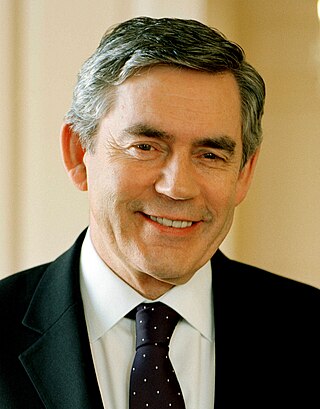
James Gordon Brown is a British politician who served as Prime Minister of the United Kingdom and Leader of the Labour Party from 2007 to 2010. He previously served as Chancellor of the Exchequer under Tony Blair from 1997 to 2007. He was Member of Parliament (MP) for Dunfermline East from 1983 to 2005 and, following boundary changes, Kirkcaldy and Cowdenbeath from 2005 to 2015. Brown is both the most recent Labour Party politician and the most recent Scottish politician to hold the office of prime minister.

Douglas Garven Alexander is a Labour politician who served as Member of Parliament (MP) for Paisley and Renfrewshire South, previously Paisley South, from 1997 until his defeat in 2015. During this time, he served as Chancellor of the Duchy of Lancaster, Scottish Secretary, Transport Secretary and International Development Secretary in the Cabinet under Prime Ministers Tony Blair and Gordon Brown. He subsequently served in Ed Miliband's Shadow Cabinet as Shadow Secretary of State for Work and Pensions and Shadow Foreign Secretary.

The Isaac Newton Institute for Mathematical Sciences is an international research institute for mathematics and its many applications at the University of Cambridge. It is named after one of the university's most illustrious figures, the mathematician and natural philosopher Sir Isaac Newton and occupies one of the buildings in the Cambridge Centre for Mathematical Sciences.

Anthony Stephen Fauci is an American physician-scientist and immunologist who served as the director of the National Institute of Allergy and Infectious Diseases (NIAID) from 1984 to 2022, and the chief medical advisor to the president from 2021 to 2022. Fauci was one of the world's most frequently cited scientists across all scientific journals from 1983 to 2002. In 2008, President George W. Bush awarded him the Presidential Medal of Freedom, the highest civilian award in the United States, for his work on the AIDS relief program PEPFAR.
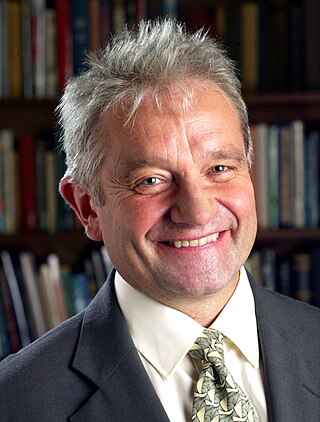
Sir Paul Maxime Nurse is an English geneticist, former President of the Royal Society and Chief Executive and Director of the Francis Crick Institute. He was awarded the 2001 Nobel Prize in Physiology or Medicine along with Leland Hartwell and Tim Hunt for their discoveries of protein molecules that control the division of cells in the cell cycle.

Joseph Lyman DeRisi is an American biochemist, specializing in molecular biology, parasitology, genomics, virology, and computational biology.
Susan Fiona Dorinthea Michie is a British academic, clinical psychologist, and professor of health psychology, director of The Centre for Behaviour Change and head of The Health Psychology Research Group, all at University College London. She is also an advisor to the British Government via the SAGE advisory group on matters concerning behavioural compliance with government regulations during the COVID-19 pandemic. In 2022, she was appointed Chair of the World Health Organisation’s (WHO) Technical Advisory Group on Behavioural Insights and Sciences for Health.

Mark Drakeford is a Welsh politician serving as First Minister of Wales and Leader of Welsh Labour since 2018. He previously served in the Welsh Government as Cabinet Secretary for Finance from 2016 to 2018 and Minister for Health and Social Services from 2013 to 2016. Drakeford was first elected as the Member of the Senedd (MS) for Cardiff West in 2011.
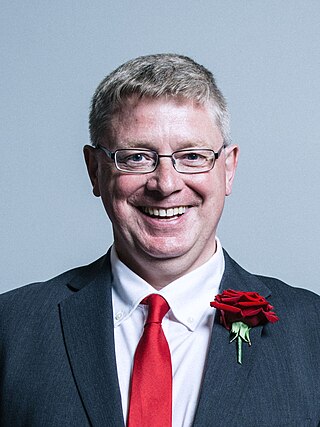
Martin David Whitfield is a Scottish Labour politician and former lawyer and primary school teacher who has been a Member of the Scottish Parliament (MSP) for the South Scotland region and the Convener of the Standards and Procedures and Public Appointments Committee since 2021.
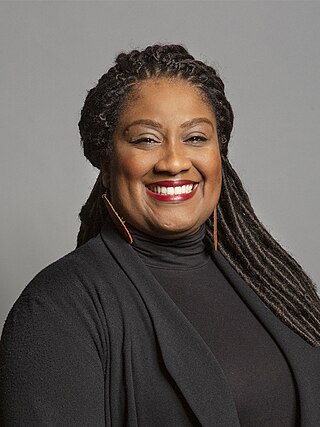
Bellavia Janet Ribeiro-Addy is a British Labour Party politician who has served as the Member of Parliament for Streatham since the 2019 general election. In 2020, she was briefly Shadow Minister for Immigration. She chairs the All-Party Parliamentary Group for Afrikan Reparations. She has described herself as a "life-long socialist".

The COVID-19 pandemic, also known as the coronavirus pandemic, is a global pandemic of coronavirus disease 2019 (COVID-19) caused by severe acute respiratory syndrome coronavirus 2 (SARS-CoV-2). The novel virus was first identified in an outbreak in the Chinese city of Wuhan in December 2019. Attempts to contain it there failed, allowing the virus to spread to other areas of Asia and later worldwide in 2020. The World Health Organization (WHO) declared the outbreak a public health emergency of international concern (PHEIC) on 30 January 2020. The WHO ended its PHEIC declaration on 5 May 2023. As of 28 September 2023, the pandemic had caused 770,874,669 cases and 6,959,303 confirmed deaths, ranking it fifth in the deadliest epidemics and pandemics in history.
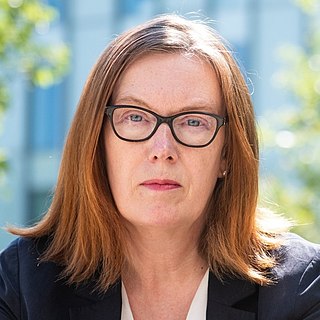
Dame Sarah Catherine Gilbert FRS is an English vaccinologist who is a Professor of Vaccinology at the University of Oxford and co-founder of Vaccitech. She specialises in the development of vaccines against influenza and emerging viral pathogens. She led the development and testing of the universal flu vaccine, which underwent clinical trials in 2011.

The COVID-19 pandemic in the United Kingdom is a part of the worldwide pandemic of coronavirus disease 2019 (COVID-19) caused by severe acute respiratory syndrome coronavirus 2 (SARS-CoV-2). In the United Kingdom, it has resulted in 24,715,857 confirmed cases, and is associated with 229,307 deaths.
The Scientific Advisory Group for Emergencies (SAGE) is a British Government body that advises central government in emergencies. It is usually chaired by the United Kingdom's Chief Scientific Adviser. Specialists from academia and industry, along with experts from within government, make up the participation, which will vary depending on the emergency. SAGE gained public prominence for its role in the 2020 COVID-19 pandemic in the United Kingdom.

The COVID-19 pandemic has affected many scientific and technical institutions globally, resulting in lower productivity in a number of fields and programs. However, the impact of the pandemic has also led to the opening of several new research funding lines for government agencies around the world.
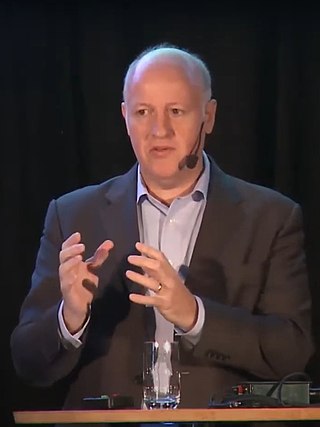
Peter Daszak is a British zoologist, consultant and public expert on disease ecology, in particular on zoonosis. He is the president of EcoHealth Alliance, a nonprofit non-governmental organization that supports various programs on global health and pandemic prevention. He is also a member of the Center for Infection and Immunity at the Columbia University Mailman School of Public Health. He lives in Suffern, New York.
Andrew Rambaut is a British evolutionary biologist, as of 2020 professor of molecular evolution at the University of Edinburgh.

Since the beginning of the COVID-19 pandemic, there have been efforts by scientists, governments, and others to determine the origin of the SARS-CoV-2 virus. Most scientists agree that, as with many other pandemics in human history, the virus is likely derived from a bat-borne virus transmitted to humans via another animal in nature or during wildlife trade such at that in food markets. Many other explanations, including several conspiracy theories, have been proposed. Some scientists and politicians have speculated that SARS-CoV-2 was accidentally released from a laboratory. This theory is not supported by evidence.

The COVID-19 lab leak theory, or lab leak hypothesis, is the idea that SARS-CoV-2, the virus that caused the COVID-19 pandemic, came from a laboratory. The theory is highly controversial; most scientists believe the virus spilled into human populations through natural zoonosis, similar to the SARS-CoV-1 and MERS-CoV outbreaks, and consistent with other pandemics in human history. Available evidence suggests that the SARS-CoV-2 virus was originally harbored by bats, and spread to humans from infected wild animals, functioning as an intermediate host, at the Huanan Seafood Market in Wuhan, Hubei, China, in December 2019. Several candidate animal species have been identified as potential intermediate hosts. There is no evidence SARS-CoV-2 existed in any laboratory prior to the pandemic, or that any suspicious biosecurity accidents happened in a laboratory.
Jemma Louise Geoghegan is a Scottish-born evolutionary virologist, based at the University of Otago, New Zealand, who specialises in researching emerging infectious diseases and the use of metagenomics to trace the evolution of viruses. As a leader in several government-funded research projects, Geoghegan became the public face of genomic sequencing during New Zealand's response to COVID-19. Her research has contributed to the discussion about the likely cause of COVID-19 and the challenges around predicting pandemics. She was a recipient of the Young Tall Poppy Award in 2017, a Rutherford Discovery Fellowship in 2020, and the 2021 Prime Minister's Emerging Scientist Prize.
References
- ↑ "About SFL". Archived from the original on 3 July 2022.
- 1 2 "About Us". Scientist of Labour. Retrieved 4 April 2021.
- ↑ Schofield, Kevin (29 January 2020). "EXCL Gordon Brown backs Ian Murray's bid to become deputy Labour leader". Politics Home. Retrieved 4 April 2021.
- ↑ "Obituary: Prof Willie Russell, molecular virologist, founder of Scientists for Labour, and Boys' Brigade visionary". The Scotsman. 12 November 2018. Retrieved 4 April 2021.
- ↑ Dickson, David (1 March 1997). "UK parties differ on means, not ends". Nature. 386 (6623): 314–315. Bibcode:1997Natur.386..314D. doi:10.1038/386314a0. S2CID 4372642 – via www.nature.com.
- ↑ Inge, Sophie (7 April 2020). "Labour scientists call for cabinet-level shadow science role". Research Professional News. Retrieved 4 April 2021.
- ↑ "House of Commons - Science and Technology - Written Evidence - Appendix 98 - Memorandum from Scientists for Labour". publications.parliament.uk. January 2005. Retrieved 4 April 2021.
- ↑ "Scientists for Labour and COVID-19". Scientist of Labour. Retrieved 4 April 2021.
- ↑ "Keir Starmer thanks Scientists for Labour volunteers". 28 May 2020. Retrieved 4 April 2021– via www.youtube.com.
- ↑ "Gordon Brown: Scientific collaboration in a post-brexit world" – via www.youtube.com.
- ↑ Lawrence, Baroness Doreen (April 2020). "An Avoidable Crisis - The disproportionate impact of Covid-19 on Black, Asian and minority ethnic communities" (PDF). Retrieved 4 April 2021.
- ↑ Christie, Kevan (22 May 2020). "UK and Scottish Government's failed to prepare for pandemic says new report". The Scotsman. Retrieved 4 April 2021.
- ↑ Buckley, Joe (21 April 2020). "Scientists for Labour: What we're doing, and how you can help". LabourList. Retrieved 4 April 2021.
- ↑ Inge, Sophie (23 April 2020). "Labour Pushes Government To Publish Its Science Advice". Research Professional News. Retrieved 4 April 2021.
- ↑ Fernando, Benjamin; Brown, Gordon; Thomas, Emily; Head, Michael; Nurse, Paul; Rees, Martin (22 September 2020). "COVID-19 shows UK–EU collaborations are irreplaceable". Nature. 586 (7828): 200. Bibcode:2020Natur.586..200F. doi: 10.1038/d41586-020-02687-6 . PMID 32963368.
- ↑ "About SFL". Archived from the original on 16 March 2022.
- ↑ "About SFL". Archived from the original on 3 July 2022.
- ↑ "ABOUT SFL". SfL. Retrieved 3 November 2022.
- ↑ "Labour scientists choose new executive committee". Research Professional News. 3 August 2022. Retrieved 3 November 2022.
- ↑ "LOCAL BRANCHES". SfL. Retrieved 23 September 2021.